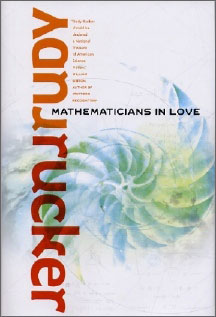 |
 Rudy Rucker
Rudy Rucker
Mathematicians in Love
Reviewed by: Rick Kleffel © 2007
Tor / Tom Doherty Associates
US First Edition Hardcover
ISBN 0-765-31584-X
364 Pages; $24.95
Publication Date: 12-01-2006
Date Reviewed: 02-14-07
Index:
Science Fiction
General Fiction
"Wonder, madness and love." You'll knock into the three of these in the first paragraph of Rudy Rucker's 'Mathematicians in Love'. But there's a book full of them to follow. Working pretty much in the genre he created called Transreal fiction, Rucker provides readers with a remarkably imaginative, constantly entertaining and very genial adventure that incorporates lots of wicked satire. Oh, there are moments of pure silliness as well. But Rucker's latest novel is something like an 'Alice In Wonderland' for adults, a romp down the dimensional rabbit hole into edited Earths, obstreperous aliens and personable deities. Yes, god's just around the corner, and she's nice but not necessarily happy.
Bela, who narrates the novel in the first person (this is an important aspect of Rucker's transrealism) is a mathematician at Humelocke University, a sort of alternate version of Berkeley. He and his roommate Paul are trying to pump out their graduate theses; Bela, more of an intuitive, artistic type is working on something called the "Morphic Classification Theorem", while Paul, the more methodical of the two has finished his and is looking for a job. Their advisor, Roland Haut, is something of a crank. But between the three of them, they've stumbled onto that fabled mathematical building block of the universe. In short order, they're altering the fabric of reality, seeing aliens and competing for the same girl. Things can only get weirder.
Rucker's strengths as a creator of character help carry the reader from our world into many weirder worlds. Bela, Paul and the whole milieu of "Humelocke" (the British empiricists will not be denied even in an alternate reality) are grounded in everyday worries and woes. Bela operates on hunches, on intuitions and guesses. Bela's voice carries the story easily. His decisions make sense, even as the world grows progressively weirder. He's a bit off kilter, but reads like someone you might know. He's that hyper-intelligent, goofy dreamer you probably knew who tended to fade into the background. As such, he makes a perfect background for the novel as he asserts himself and literally takes control of his world. Paul, his foil, is more ruthless, more methodical, more "normal". He's much less of a nice guy, but as a character, in particular a grad student mathematician, he really rings true. It's Bela who earns the affections of Alma, who moves in with the two of them only to find herself more attracted to the feet-on-the-ground, job-in-his-pocket Paul. Thus is a love triangle formed, then complicated by Cammy, the bass playing singer in Bela's band. Rucker's wild weirdness is nicely grounded by a quartet of characters who seem as if they might just have walked in from the quad.
Rucker's language is transparent and easy-to-read, even when he's tossing around some pretty complex mathematical ideas. But what makes 'Mathematicians in Love' such a joy to read is his ability to seem friendly and kind but really, really smart. He has a goofy sense of humor that makes you think, makes you laugh and makes you smile. He even gets off some seriously scathing satiric jabs at the expense of politicians without seeming heavy-handed or cruel, even when he is being rather cruel. Reading 'Mathematicians in Love' is like having a conversation with your smart, interesting friend. Time flies and you have fun. And even though you're a lot smarter afterwards, you don’t feel like you attended a lecture. It's more like being enraptured by a compelling documentary.
Of course, no documentary covers the wild and weird worlds of Rudy Rucker. Bela and Paul start out at Humelocke, but soon find themselves in bubble worlds populated by some pretty crazy aliens — crazy in all senses of the word. That Rucker can transition pretty smoothly from the realistically rendered grad school setting into surreal vistas of talking, flying squids (look out Margaret Atwood!) is a testament to his ability to generate a true sense of wonder and not really a suspension, more like an annihilation of disbelief. His math quickly transcends to magic while the very real and the unreal become one. Carrying us forward is Bela's struggle to figure out which girl is the right girl and to discover or create a decent world to live in.
'Mathematicians in Love' provides readers with the full range of ideas, emotions and plot arcs that one can find in a novel. Love, terror, the mundane and the surreal strut their stuff and make some pretty trenchant points about the mess we find ourselves in the here and now. It's a very clever and well-wrought journey from someplace very much like the now, through places so surreal they almost defy description to the now. OK, so Margaret Atwood is probably not going to be down with this novel on account of the talking, flying squid. That's her loss in this world. What if this is the most perfect of all possible worlds, only we're so oblivious to the wonder that we just don’t get it? That a loss we need not endure if we read Rucker and take to heart his peculiar visions of joy, strangeness and charm.
|
 |
